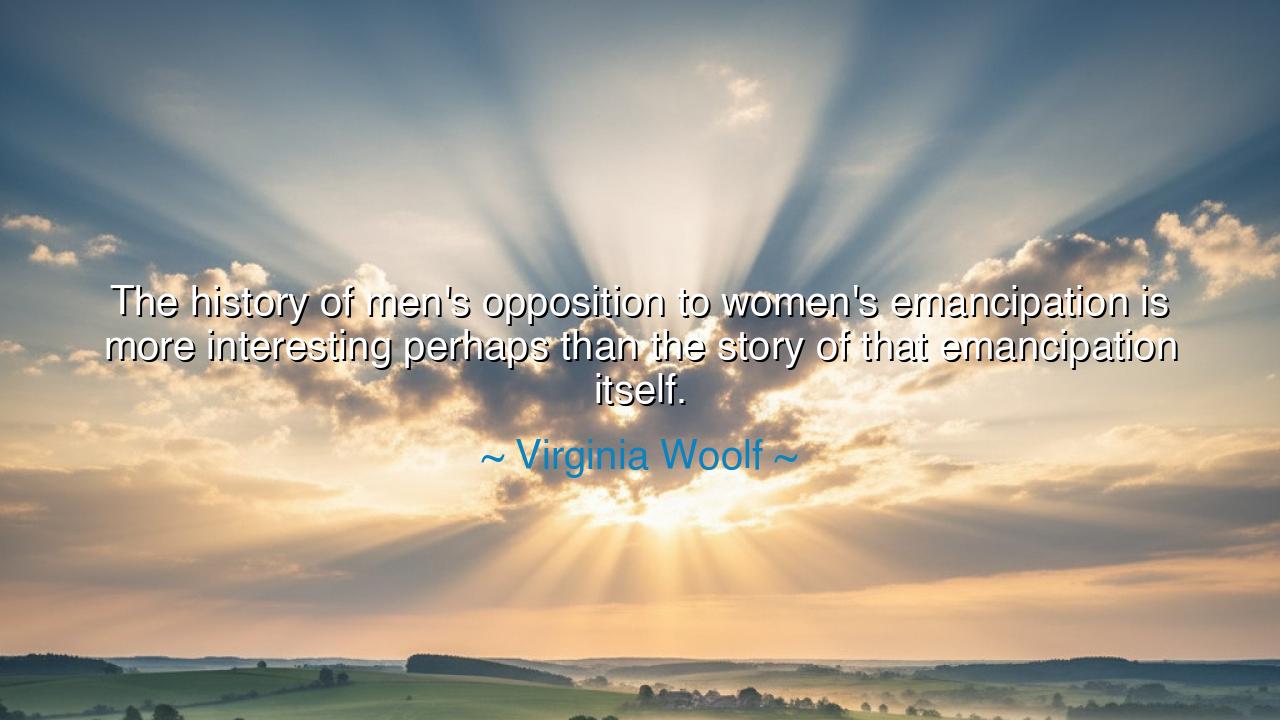
The history of men's opposition to women's emancipation is more
The history of men's opposition to women's emancipation is more interesting perhaps than the story of that emancipation itself.






When Virginia Woolf declared, “The history of men's opposition to women's emancipation is more interesting perhaps than the story of that emancipation itself,” she spoke with the sharp insight of a historian and the piercing clarity of a philosopher. Her words illuminate a paradox: that the struggle for liberation is defined as much by the forces that resist it as by the courage and ingenuity of those who pursue it. By studying opposition, Woolf suggests, we can understand the deeper currents of power, fear, and social structure — the invisible chains that have sought to bind women for centuries. It is in the contestation of freedom, not merely its attainment, that the true drama of human history unfolds.
The origin of this reflection lies in Woolf’s life and work as a writer, critic, and advocate for women’s rights in early 20th-century England. Through essays such as A Room of One’s Own and her lectures on gender and society, Woolf observed that the story of women’s emancipation is incomplete without recognizing the persistent, often subtle, resistance of patriarchal structures. Laws, social norms, education, and literature were all battlegrounds where male opposition shaped the paths women could follow. Woolf understood that oppression is instructive: it reveals the anxieties, contradictions, and strategies of those who seek to preserve inequality.
Her words resonate with the wisdom of the ancients. Consider the philosophical debates of Athens and Rome, where women were largely excluded from civic life. Their absence from public power was enforced not only through law but through social expectation and custom. By examining these restrictions, historians can see the underlying fears of male-dominated societies — fears that power, autonomy, and intellect in women might destabilize established hierarchies. Woolf emphasizes that the story of resistance, and the methods used to maintain dominance, can illuminate the very nature of social control.
History provides many vivid examples. The story of Mary Wollstonecraft, author of A Vindication of the Rights of Woman, is instructive. Wollstonecraft’s arguments for education and equality were met with scorn, satire, and moral condemnation, illustrating the ways society opposed emancipation. Yet it is precisely this opposition that sharpens the narrative: by understanding the resistance, we see the stakes, the courage required, and the resilience necessary for change. Woolf suggests that the contours of oppression reveal as much truth as the triumphs of liberation itself.
Woolf’s reflection also carries a profound psychological insight: the forces that oppose change often illuminate the mechanisms of thought and power. In observing opposition, we see the anxieties of those who cling to privilege, the rationalizations that maintain inequality, and the subtle ways ideology is encoded in everyday life. Just as a river’s flow is revealed by the rocks that divert it, the course of emancipation is made visible by the resistance it encounters. Understanding opposition, therefore, is a form of wisdom — a way to anticipate challenges and deepen insight into human nature.
The lesson of her words extends beyond gender politics into all struggles for justice. Any movement toward equity or reform encounters resistance, and it is often in studying the opposition that we learn strategy, empathy, and perseverance. Civil rights, labor movements, and democratic reforms have all been clarified by observing those who resist change — their fears, tactics, and vulnerabilities reveal the architecture of the systems we seek to transform. Woolf’s insight teaches that knowledge of opposition is as vital as the pursuit of progress itself.
O listener, take this wisdom to heart: study the structures, minds, and methods that resist justice, for in them lie the maps of challenge and opportunity. Recognize that opposition is not only a barrier but a teacher, revealing weaknesses to exploit and truths to understand. In life, as in history, the forces arrayed against progress can illuminate paths forward, strengthen resolve, and sharpen judgment.
In the end, Virginia Woolf reminds us that the story of liberation is not merely the recounting of victories, but an exploration of the interplay between resistance and courage. By observing opposition, we learn the depth of struggle, the ingenuity required for change, and the enduring resilience of the human spirit. True wisdom arises not from triumph alone, but from understanding the trials, the denials, and the obstacles that shape the arc of emancipation, revealing both the darkness that constrains and the light that persists.






AAdministratorAdministrator
Welcome, honored guests. Please leave a comment, we will respond soon